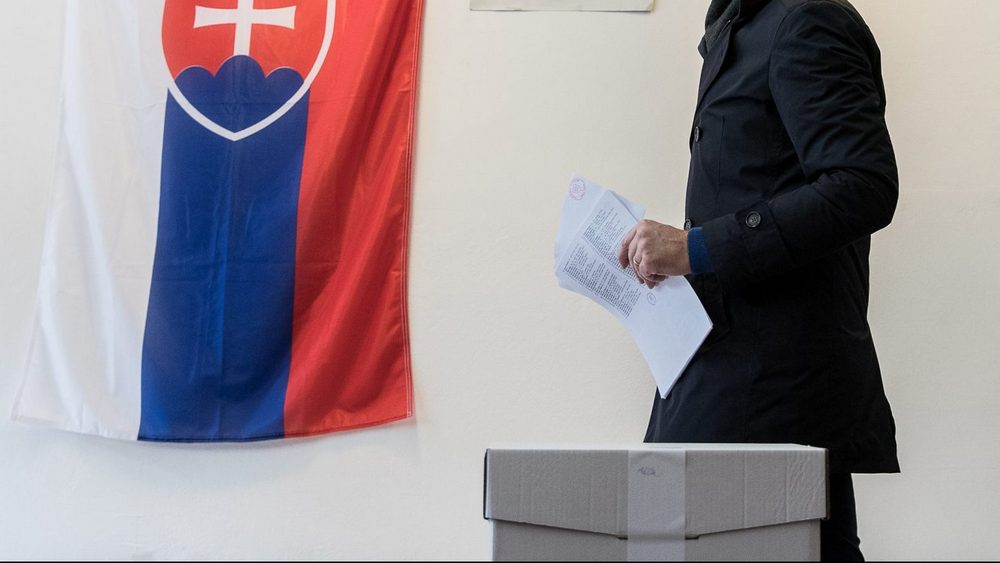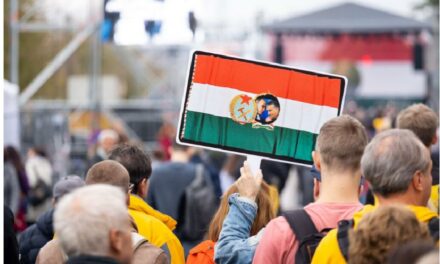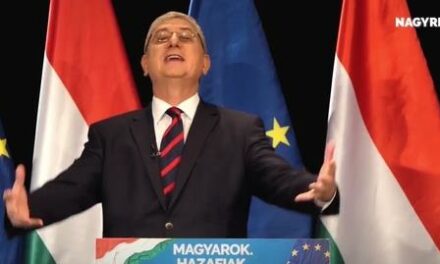On Saturday, the Hungarian party called Szövetsé achieved a historic success in the local and county elections in Slovakia. But we haven't learned any more important lessons.
János Árpád Potápi , the State Secretary of the Prime Minister's Office responsible for national policy, stated at the press conference evaluating the results of the vote, referring to the fact that Hungarian parties united a year ago: "the preliminary work has borne fruit." The Alliance has become a prominent party in the southern Slovakian region, and they must be reckoned with "very strongly" in national politics as well. The current results create the possibility that the Hungarians in Slovakia will have a very strong parliamentary representation.
He justified the necessity of the unification by saying that, although the number of Hungarians in Slovakia is 8.5 percent, in the last election no ethnic Hungarian party entered the Slovak legislature either partially or entirely.
János Árpád Potápi explained: the Association has significantly increased the number of county representative seats, it will have 54 representatives in five southern counties, which is 12 more than before. The Association won 263 mayoral positions, of which it won independently in 222 settlements, and in another 41 places the settlements will be managed in a coalition, which is "a huge achievement".
Krisztián Forró , the president of the Upland Association, said that the result exceeded all expectations and preliminary assessments. "The Slovak media and politicians don't really know what to do with this result, neither spit it out nor swallow it," he said, and then emphasized that the results showed the strength of the party and the Hungarian community. Currently, the Association has the largest number of county representatives in Slovakia who were elected in the colors of one party, he pointed out.
Krisztián Forró said: "we not only kept our bastions, but also strengthened them", and then indicated that far more people than Hungarians voted in Nagyszombat and Nyitra counties for the Association's county presidential candidate.
Among other things, he justified the importance of unified Hungarian representation in the Slovak legislature by the fact that road and railway developments in the Hungarian-inhabited southern regions had lagged behind, which, he declared, was unacceptable. He added: Southern and Eastern Slovakia were treated as stepchildren by the central government.
The 7 great lessons of the county and municipal elections
The good election result that many owners would like to have. This is exactly what happened in Felvidék, surprising even the candidates themselves. Since Saturday night, one analysis has hit the other, but several important lessons have not yet been sufficiently learned, writes Zsolt Király in his analysis published on korkep.sk
1. Hungarians in the highlands are united, and the Alliance continues to suffer from internal struggles
One would expect that after such a result (54 county representatives, 2-3 expected county vice presidents, 263 mayors, more than 1,700 local representatives, 505,000 votes collected), the Alliance-Alliance would finally come together and put aside its internal contradictions. The opposite is happening. Due to:
Some actors of Most-Híd and the Unity platform were not initially interested in the success of the Hungarian community with Berényi's attack. Now that the MKP politicians have brought the result, the three toxic politicians, László Solymos, Konrád Rigó (Most-Híd) and Mózes Szabolcs (but there are others hiding there besides him), who had previously attacked Forró and Berényi, apparently joined the among the winners. However, the digging of trenches continues inland.
The OT chairman Solymos did not even come to the evaluation National Board meeting and the subsequent press conference, the platform chairman Rigó blackmailed Berényi at the board meeting to challenge the terms of his nomination, and the increasingly pathetic Mózes Szabolcs (Összefogas) is constantly spinning like a windcock. The latter "politician" will be especially worth paying attention to in the Hungarians of the highlands. After Béla Bugár, he grew into the most duplicitous, totally unprincipled, rubber-backed public figure.
2. Whose merit is the election result?
The fact that the Alliance-Alliance won the elections ahead of all other parties behind the independents (they won 505,000 votes, the second Hlas 400,000) is due to the specificity of county and municipal voting. There they vote for the candidates themselves. There is no place for ideology or platforms, and most importantly, none of the toxic politicians (Solymos, Rigó, Mózes) ran. On the other hand, the leaders of the MKP platform did, and they brought the result (respect to the winning candidates of the other two platforms as well.)
Whether some people like it or not, it confirmed Krisztián Forró in the party chair, who would certainly like to lead the party alliance in the parliamentary elections as well.
3. The parliamentary election will be a completely different matter
There, the divisive topics and the discredited, already mentioned toxic politicians come into the picture, which will all make it difficult to enter the parliament. We explained why in this article. In any case, without the now independent mayors and their voter base, the party will have a hard time getting into the legislature. The task is therefore to solve this issue.
4. Platforms have expired, they must be eliminated
If we take a look at the 54 county representatives, their distribution according to platforms is as follows:
31 people are county representatives connected to the MKP platform
17 people are county representatives linked to the Most-Híd platform
6 persons County representative linked to the Zéfogas platform
This is almost 60 percent for MKP. The national leadership, on the other hand, is currently taking the position that the MKP is 50 percent, and the other two platforms are the other 50 percent.
Based on the results, we see that it is completely without merit. The Association was able to succeed because it showed itself to be united. No one solved it, and the average voter didn't know who was coming from which platform (thanks to this, many new and colluding politicians who otherwise would not have had a chance won a mandate). The platforms are therefore redundant from the outset, they must be abolished so that the Alliance-Alliance can be unified even before the parliamentary elections.
If this is not done, the two smaller platforms will continue to parasitize on the results achieved by the MKP platform (respect to the exceptions this time as well.) How this is all the case is clearly demonstrated by the activities of Simon Zsolt's almost invisible Hungarian Forum. In the last parliamentary elections, they ran as the trio of MKP-Hungarian Forum-Összefogas on the list of the Hungarian Community Unity, and with the money they received for the election results, they openly tried to weaken the county chief and mayor candidates of the Association in the current elections.
5. The lesson of the Komárom defeat
The downfall of Ildikó Bauer (Szövetség-Aliancia) in Komárom was primarily caused by his team's lack of local knowledge. Not knowing the Hungarian folk psychology of the highlands, they thought they could do anything, and moreover, they put it on the wrong horse. By pushing the bike too far, the Bélá Keszeghs essentially threw water at the mill from the beginning.
They were able to get barely 3 people into the 25-member city council, who probably would have been included even without a campaign. At the same time, the highly expensive, professional campaign, unprecedented on the Hungarian level in the highlands, had a lot of good elements, which were drawn from in several places and will probably be drawn from in the future. In terms of content, graphics, and professionalism, it was almost flawless. The problem was the candidate and too much money spent on him.
With the fact that Ildikó Bauer shows a rather mixed picture based on his political career so far (you mean, he was invisible as a politician and then suddenly jumped out with the campaign), he was unable to convince the city that he is credible and suitable for mayor. The intensive campaign thus only strengthened these doubts. His victims were the Alliance's representative candidates, who bled together with him. In the end, Ildikó Bauer failed as both mayor and local representative candidate, but he got into the county without a bone. Apart from Komárom, the Hungarians of the county did not necessarily reward the politician, but also his other community work, cultural organizer and singer-performer abilities.
It is scant consolation that Tímea Etheykatz, who was vocal about complaints and betrayals in her campaign, was also put off as a candidate for mayor and representative.
6. Progressive mixed cold cuts
One of the specifics of the October 29 elections was that at the local level, the progressives showed themselves in a more independent guise.
In Gúta, the difference between reality and progressive, liberal manipulation was clearly shown. One of the meanest moves before the elections takes place in Gúta. Where, while the progressives and the misguided conservatives who started with them were negotiating with their opponents about the fair and correct campaign, they were already fliers of their own, fake survey in the mailboxes of the city. And what was the result? 1. Béla Halász (independent) – 1,548 votes, 2. Árpád Horváth (Szövetség) 3. Ernő Kárpáty (independent-Progressive) – 781 votes. One of the progressive accomplices, Attila Forgács, did not even make it into the representative body.
7. It matters who puts what on the table
The people of Ipolyság believed that Zachar Pál, who also joined the coalition, could be a suitable city manager. In one of my analyzes of his mayoral contest four years ago, I asked him to account for his results, to see what he based his campaign statements on, which at that time were quite "knowing about everything". Also the actions listed behind the slogans in the past four years. His efforts proved sufficient for the people of Ipolyságia. This also supports the fact that an empty campaign does not reach its goal with the people from the highlands. The eyes watching social media quickly noticed that he tapped the know-how of Komárom in elements of his Ipolyság campaign, but it was certainly quieter and did not replace it, but merely amplified the aspirations.
Lesson learned? People cannot be led. People punish them for being seen as stupid.
Source: 2022plusz / körkép.sk / MTI
Featured image: MTI/EPA/Jakub Gavlak












